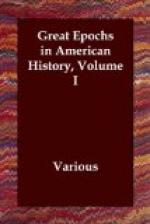They took us to a town on the edge of a range of mountains, to which the ascent is over difficult crags. We found many people there collected out of fear of the Christians. They received us well, and presented us all they had. They gave us more than two thousand back-loads of maize, which we gave to the distrest and hungered beings who guided us to that place. The next day we dispatched four messengers through the country, as we were accustomed to do, that they should call together all the rest of the Indians at a town distant three days’ march. We set out the day after with all the people. The tracks of the Christians and marks where they slept were continually seen. At mid-day we met our messengers, who told us they had found no Indians, that they were roving and hiding in the forests, fleeing that the Christians might not kill nor make them slaves; the night before they had observed the Christians from behind trees, and discovered what they were about, carrying away many people in chains....
From this spot, called the river Petutan, to the river to which Diego de Guzman came, where we heard of Christians, may be as many as eighty leagues; thence to the town where the rains overtook us, twelve leagues, and that is twelve leagues from the South Sea. Throughout this region, wheresoever the mountains extend, we saw clear traces of gold and lead, iron, copper, and other metals. Where the settled habitations are, the climate is hot; even in January the weather is very warm. Thence toward the meridian, the country unoccupied to the North Sea is unhappy and sterile. There we underwent great and incredible hunger. Those who inhabit and wander over it are a race of evil inclination and most cruel customs. The people of the fixt residences and those beyond regard silver and gold with indifference, nor can they conceive of any use for them.




